Iran's currency plumbs new lows after Assad's ouster
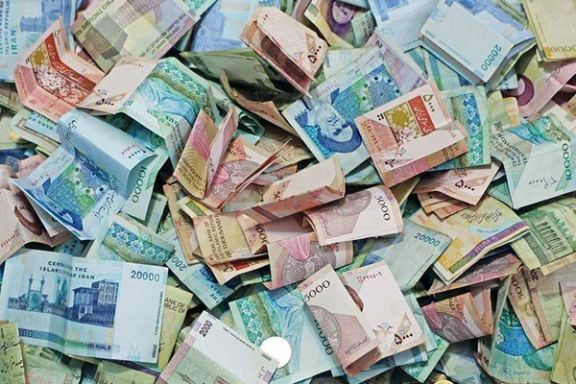
The Iranian rial has hit new lows in the wake of Bashar al-Assad’s fall in Syria, in a sign that the ouster of Tehran's main Arab ally may be hollowing out economic confidence.

The Iranian rial has hit new lows in the wake of Bashar al-Assad’s fall in Syria, in a sign that the ouster of Tehran's main Arab ally may be hollowing out economic confidence.
The dollar was trading at more than 730,000 rials in Tehran’s free exchange market on Tuesday, up from 700,000 just a week ago.
The downfall of Assad, whose ruling family has been the one of the Islamic Republic's earliest and strongest allies since 1979, severs Iran's land corridor to Lebanon which supplied weapons to Hezbollah for its periodic confrontations with Israel.
The slide adds to Iran’s vulnerabilities and could indicate its relative weakness in the region.
In addition to recent regional setbacks, the Islamic Republic faces the imminent challenge of Donald Trump assuming office in the United States, who will likely ramp up economic pressure on Tehran.
The euro was trading at almost 770,000 rials, as most other hard currencies rose in tandem with the US dollar in Tehran. The rial has fallen 18-fold since 2018, when the United States withdrew from the JCPOA nuclear deal and imposed sanctions on Tehran.
Before the establishment of the Islamic government in 1979, the US dollar was worth just 70 rials.
The rial’s steady decline signals further price hikes in Iran as imports grow more expensive, with inflation already nearing 50 percent. Meanwhile, oil exports constrained by sanctions have fail to generate sufficient foreign currency to stabilize the rial.
The only recourse for Tehran is to convince the US to lift its economic sanctions, but so far, Iran has not made sufficient concessions on its ambitious nuclear program or its regional policies to sway Washington.
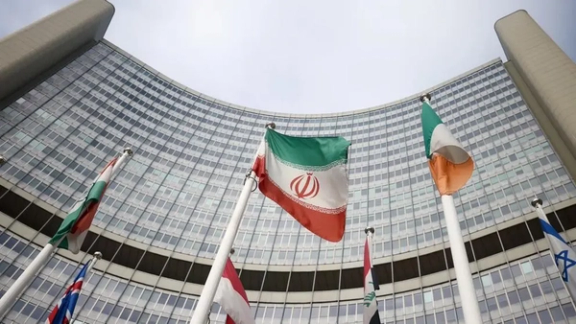
Iran's Foreign Ministry has rejected the joint statement issued by the United Kingdom, France, and Germany criticizing Tehran for enriching uranium to near weapons-grade, saying Tehran was acting within its international rights.
Iran’s decision to employ advanced centrifuges and enrich uranium to higher levels falls within its rights under the Non-Proliferation Treaty (NPT), the ministry 's spokesperson Esmail Baghaei argued on Tuesday. These measures comply with International Atomic Energy Agency (IAEA) oversight protocols, he added.
"The Islamic Republic of Iran, as a responsible member of the IAEA, has proven its commitment to cooperation with this body," Baghaei said, referring to recent discussions with IAEA Director General Rafael Grossi in Tehran.
"It is regrettable that these European countries, instead of building on the constructive engagements, continue with unhelpful and confrontational approaches."
The European trio, collectively known as the E3, issued a statement on Tuesday condemning Iran's actions as undermining the Joint Comprehensive Plan of Action (JCPOA), the 2015 nuclear deal. Their statement highlighted concerns over uranium enrichment at the Fordow facility to near-weapons-grade levels and an increase in the number of centrifuges in operation.
"Iran’s actions have further hollowed out the JCPOA," they wrote, urging Tehran to reverse course and adhere to international safeguards.
Baghaei dismissed these remarks, insisting that the current nuclear standoff stems not from Iran’s actions but from the US's withdrawal from the JCPOA in 2018 and the failure of European signatories to uphold their commitments under the deal.
Iran has long contended that its nuclear program is peaceful and that its uranium enrichment—reported to have reached 60% purity, just short of the 90% threshold for weapons-grade material—serves civilian purposes. However, this has been met with skepticism from Western nations, who argue there is no credible civilian justification for such enrichment levels.
The ongoing dispute has fueled fears of regional instability. IAEA Chief Rafael Grossi has acknowledged in recent statements that dialogue with Iran is indispensable.
However, he has warned that the lack of implementation of safeguards continues to pose significant challenges.
While the IAEA continues its efforts to mediate between Tehran and the west, diplomatic progress remains elusive.
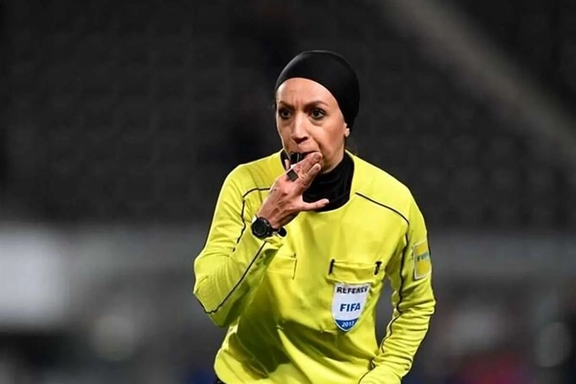
A prominent international football referee has left Iran due to threats and pressure from the country’s security forces, according to information exclusively obtained by Iran International.
The revelation that Mahsa Ghorbani departed follows a recent interview with the Shargh Network in which she highlighted challenges faced by female referees in Iran.
"I cannot continue my work or life in a country where my safety is constantly under threat," Ghorbani was quoted as saying.
Ghorbani could not be reached for comment and Iranian authorities have yet to comment on the case.
Iranian sport news website Tarafdari quoted a former Iranian referee as saying that Ghorbani intends to live in Europe but will not be seeking political asylum.
The referee had been slated to participate in high-profile competitions such as last year’s Tehran derby, officiating in the VAR room. However, opposition from government authorities and state-affiliated media prevented her involvement.
Ghorbani also missed the chance to officiate at the 2022 Qatar World Cup because she was barred from overseeing men’s matches in Iran due to her gender.
The incident is part of a broader trend of Iranian athletes seeking refuge abroad due to increasing political and social pressures.
Last month, 15-year-old table tennis player Baran Arjmand sought police protection in Denmark, refusing to return to Iran after participating in a championship.
Iranian judoka Saeid Mollaei and alpine skier Atefeh Ahmadi have similarly sought asylum in recent years, citing political and social pressures.
Ghorbani’s departure underscores rising tension between Iranian authorities and professionals in sports, the arts and academia, many of whom are leaving the country due to safety concerns and economic hardships.
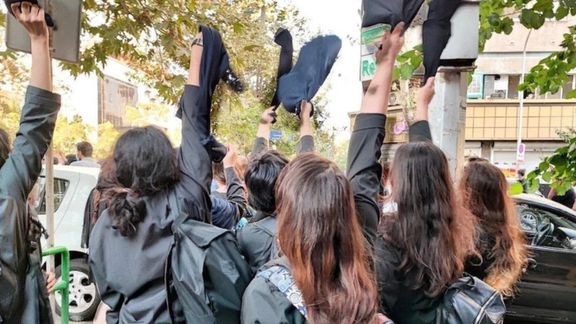
Amnesty International has condemned Iran's new compulsory veiling law, saying it intensifies the oppression of women and girls while exposing activists opposing the rules to charges carrying the death penalty.
“Iranian authorities have adopted a new draconian law that further erases the human rights of women and girls, imposing the death penalty, flogging, prison terms and other severe penalties to crush ongoing resistance to compulsory veiling,” Amnesty International said in a press release on Tuesday.
The "Law on Protecting the Family through the Promotion of the Culture of Chastity and Hijab," comprising 74 articles, is set to take effect this Friday. It imposes severe penalties on women and girls who defy veiling requirements, including exorbitant fines, prison terms, flogging, and travel bans.
Amnesty highlighted that activism against the hijab law may even be deemed “corruption on earth,” a charge punishable by death under Iran's penal code—a concern recently raised by Iranian women’s rights activists.
“This shameful law intensifies the persecution of women and girls for daring to stand up for their rights following the ‘Woman Life Freedom’ uprising,” said Diana Eltahawy, Amnesty International’s deputy regional director for the Middle East and North Africa.
Drafted in May 2023, less than a year after the Woman Life Freedom uprising sparked by the death in custody of Mahsa Amini in September 2022, the law was introduced in response to widespread defiance of compulsory veiling by women and girls, Amnesty said.
Amnesty detailed sections of the new law and how it, warning it criminalizes acts such as “nudity, indecency, unveiling and bad dressing.”
Article 50 of the law defines “unveiling” as failing to cover the head with a hijab, chador, or headscarf. “Bad dressing” is defined in Article 48 as exposing body parts below the neck, other than the hands and feet, or wearing clothing deemed to “contribute to or incite sin by others”.
However, the rights group warned terms such as “nudity” and “indecency” remain undefined in the new law, allowing for subjective interpretation and enforcement.
Under Article 48, fines for “bad dressing” begin at $160 for a first offense and rise to $4,000 for a fourth. Further infractions can result in $8,000 fines, up to five years in prison, a two-year travel ban, and a two-year ban on social media use. Article 49 mandates that “nudity” in public or online may lead to up to 10 years in prison or a $12,000 fine, with repeat offenses punishable by 15 years in prison or a $22,000 fine.
Amnesty noted that women unable to pay fines face severe restrictions, including being barred from reclaiming impounded vehicles, renewing driving licenses or passports or leaving the country. Article 56 also allows for asset seizures or imprisonment in such cases.
Article 38 prescribes up to five years in prison, travel bans, and fines for “insulting or ridiculing the hijab” or “promoting nudity, indecency, unveiling, and bad dressing.” Meanwhile, the law also bans the import and sale of clothing, dolls, mannequins, books, paintings, and other items that “promote nudity, indecency, unveiling, and bad dressing.”
“The complex web of fines, prison sentences and other severe punishments going as far as the death penalty demonstrates the state policy to control women and girls through fear and economic hardship. This law has particularly devastating consequences for the most economically disadvantaged in society,” Eltahawy added.
Amnesty warned the law grants sweeping powers to Iran’s intelligence and security forces, including the Revolutionary Guard and Basij militia, to enforce veiling rules.
Eltahawy called on the international community to act urgently, urging governments to use diplomatic and legal avenues to hold Iranian authorities accountable for systematic human rights violations.

When Canada’s former Justice Minister Irwin Cotler penned an op-ed warning of the dangers of Iran's transnational repression and plots to assassinate dissidents - he did not yet know he too was already a target.
Cotler said he was the subject of an alleged Iranian plot to kill him on Canadian soil.
The threats, according to Cotler, mean anyone who dares speak up against repression even non-Iranians as far away as Canada is in danger, imperiling free speech and posing a key national security challenge.
“My assassination attempt that I experienced should be seen as a wake- up call of a larger phenomenon,” said Cotler, adding that domestic stifling of dissent is linked to Iran's attempts to silence critics abroad.
"The confluence of massive domestic repression, which incentivizes and underpins the extraterritorial aggression targeting those who are engaged in supporting the very Iranian people that are the targets of mass repression."
In an interview with Iran International, Cotler - a vocal critic of Iran’s government - said he was informed by the Royal Canadian Mounted Police (RCMP) in October of an active plot to try and kill him.
“I was supposed to attend the 60th anniversary of my McGill Law class in Montreal. I was prepared. The [RCMP] security detail was prepared to take me there and then I was advised that day that they had a warning of an imminent assassination attempt within the next 48 hours,” said Cotler.
The Globe and Mail, a Canadian newspaper, first reported on the alleged plot in early November, citing law enforcement sources about two suspects involved in his case. Cotler said he’s not aware of the two individuals but said he received confirmation that the threat against him has been lowered substantially.
Threats for more than a year
Cotler’s life has been under threat since 2023, he said, citing Canadian authorities.
The former parliamentarian was flying back home to Montreal from Washington DC with his wife on November 14, 2023 when he was advised by RCMP officials not to leave the airport. Then the text messages started popping up on their screens from neighbors curious about armored vehicles outside the Cotler home.
From that moment he has been under 24-hour police protection. Cotler is accompanied wherever he goes including his medical treatments and family outings.
The life of Cotler and his family would be changed forever, but his voice was not to be silenced.
Armored cars, armed protection and other security details soon became the norm.
“My life was altered with my freedom of movement restricted, but it has not altered my advocacy because I know that the objective of transnational repression and assassination are carried out," said Cotler. "Their purpose is really to intimidate, to silence and to arrest the target. Because I had the beneficiary of the protection, I've been able to engage in my continued public advocacy,”
When he learned later that the threats were coming from Iran, he wasn’t surprised.
“I first advocated for putting the IRGC on the terrorist list back in 2008 when I was a Member of Parliament. It took until 2024 and I fought until it happened.”
As a lawmaker, justice minister and now as chair of human rights organization the Raoul Wallenberg Centre, Cotler has been an advocate for human rights in Iran for decades.
A former lawyer, he also represented Iranian dissidents and political prisoners throughout his career.
As a retired politician, Cotler receives protection that an average Canadian under similar circumstances would not. In speaking directly with Iranian dissidents in Canada and abroad, he understands their fears and threats they face.
One major concern is Iran’s connections to organized crime in Canada.
US law enforcement agencies say two Canadians with ties to the biker gang Hells Angels were hired at the behest of Iran’s intelligence services to carry out assassinations in Maryland.
An unsealed US indictment revealed last month that two men, allegedly hired by the Islamic Republic to kill prominent Iranian-American human rights advocate Masih Alinejad.
Alinejad, whom Cotler refers to as a friend and colleague, has been the subject of several Iranian murder-for-hire plots on US soil. The same indictment also alleges Iran planned to assassinate president-elect Donald Trump prior to the American elections.
Iran's Foreign Minister Abbas Araghchi denied that Tehran was linked to an alleged plot to kill Trump.
While Cotler continues to raise alarm bells, he said Canada can and should be doing more by taking the lead in fighting transnational repression.
In a recent conversation with Canadian Prime Minister Justin Trudeau, Colter said he encouraged the Prime Minister to make Iran's attempts to assassinate critics abroad a top priority at next year’s G7 summit, which Canada is hosting.
“The real problem has been the culture of impunity," said Cotler. "What is needed now is a culture of accountability,”
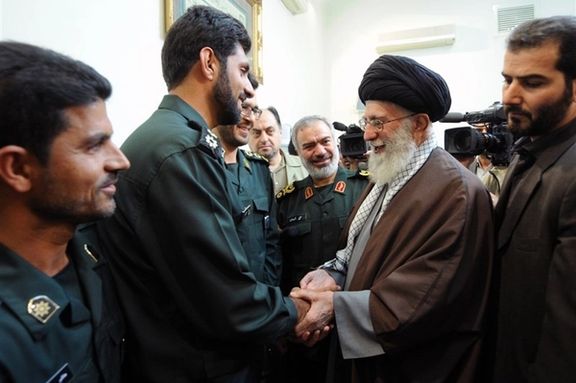
As images of brutality and prison abuses flood the internet following Bashar al-Assad’s fall, Iran’s tightly controlled media has cautiously criticized the deposed leader, hinting that a similar fate could befall the Islamic Republic.
“The lesson we should take is to be mindful so that [our] people do not get fed up and weary of the country and its circumstances and maintain their hope in the future,” conservative politician and journalist Naser Imani told Rouydad news website Monday.
While distancing Iran from Syria’s experience, he cautiously added, “The situation in the Islamic Republic is not comparable to Syria at all. Nevertheless, one should take note of the public opinion.”
Iran’s Supreme Leader, Ali Khamenei, has consistently praised Bashar al-Assad as a key figure in the “Axis of Resistance” and maintained unwavering support for him against adversaries. In 2019, during a meeting with the deposed Syrian president, Khamenei called him “the hero of the Arab world.”
Any strong criticism of Assad or Iran’s support for him could be interpreted as a challenge to Khamenei’s views, risking serious consequences for media outlets and public figures expressing such opinions.
The restrictions on criticizing Assad became apparent when several prominent public figures deleted critical social media posts soon after Assad’s ouster, often without explanation. These deletions were likely the result of pressure from security forces.
A commentary on the moderate conservative Asr-e Iran website suggested that foreign conspiracies may have played a role in Assad’s downfall, citing his support for the “Axis of Resistance.” However, it noted that Assad did not appeal to Syrians for support because he knew he would not get any.
“The question is should a government not be wise and discerning and treat its people with love and tolerance to protect itself if it is facing so much hostility from the outside?” the commentary asked, adding that ignoring the “views of the majority and the public’s demands” could be “the most damaging and fatal mistake a politician and a government can make,” as did Assad.
The Islamic Republic faces multiple crises at home and abroad, including Israeli strikes on its regional allies, economic devastation from Donald Trump’s “maximum pressure” campaign, setbacks in relations with Europe, and widespread corruption and decades-long human rights violations that have eroded public trust. Additionally, there is growing demand for greater social and political freedoms.
Ultra-hardliners dominating the Parliament have been pushing for the enforcement of a very controversial new hijab law, which even many conservatives and prominent clerics view as deeply damaging given the current circumstances.
Despite extensive moderation and the removal of “unpublishable” comments, some remarks published by the conservative Alef news website regarding recent events in Syria reveal that many ordinary Iranians are drawing parallels between Assad’s rule in Syria and the situation at home.
“A country’s power lies in its people, not its military force and the nuclear weapons,” a reader commented on an editorial Monday titled “Why Doesn’t the Syrian Army Fight [for Assad]?” The comment received 97 likes and only three dislikes, reflecting strong agreement among readers.
Another reader remarked, “There would be no civil war in Syria and not so much damage and loss of life if Assad had given its people some degree of political freedom and invited all political groups to participate in the government ten or fifteen years ago.”
This comment garnered 149 likes, with only six readers disapproving.
Similarly, readers gave strong approval to comments on another article, “Why Did Assad Fall?” published Sunday on the same website. The article attributed Assad’s downfall to his failure to reform the government.
One comment noted that Assad had claimed the backing of 95 percent of Syrians in elections held three years ago and emphasized, “social capital [is] the biggest asset of a government.”
Nearly 300 readers agreed with the comment, with only three expressing disapproval.